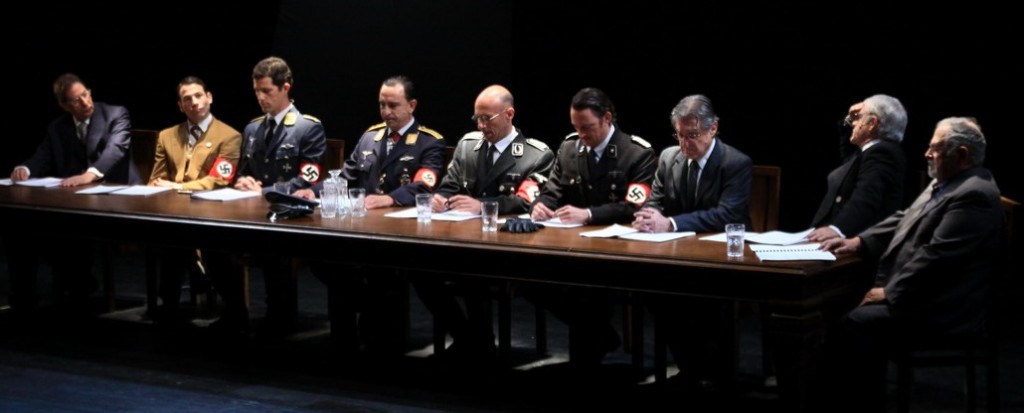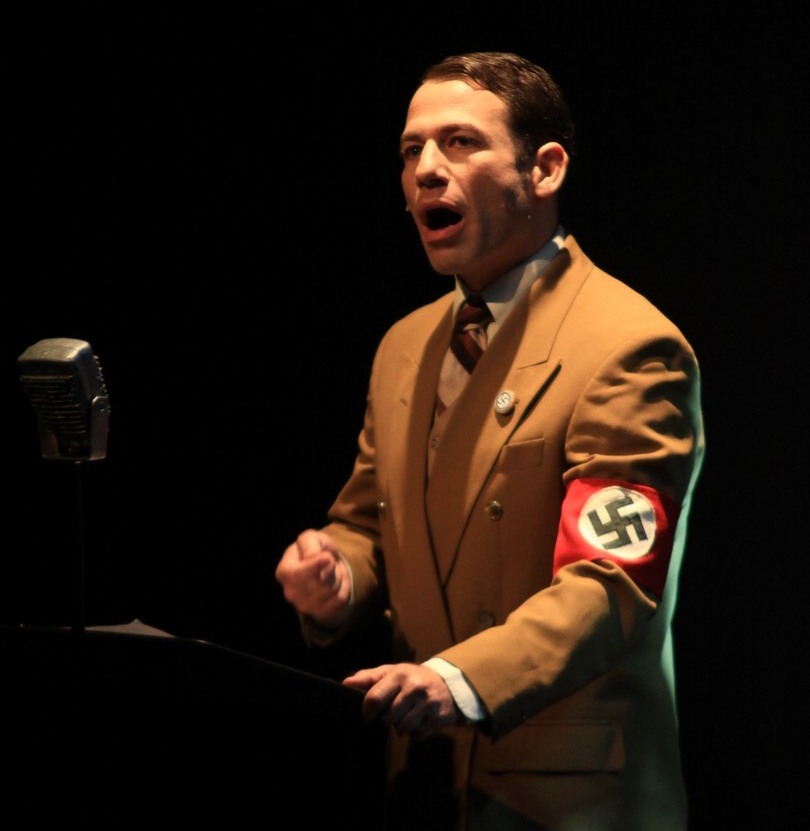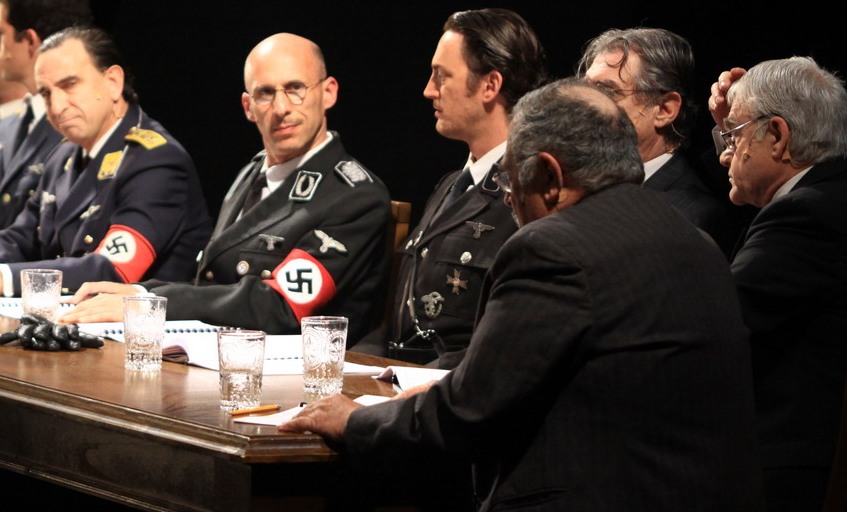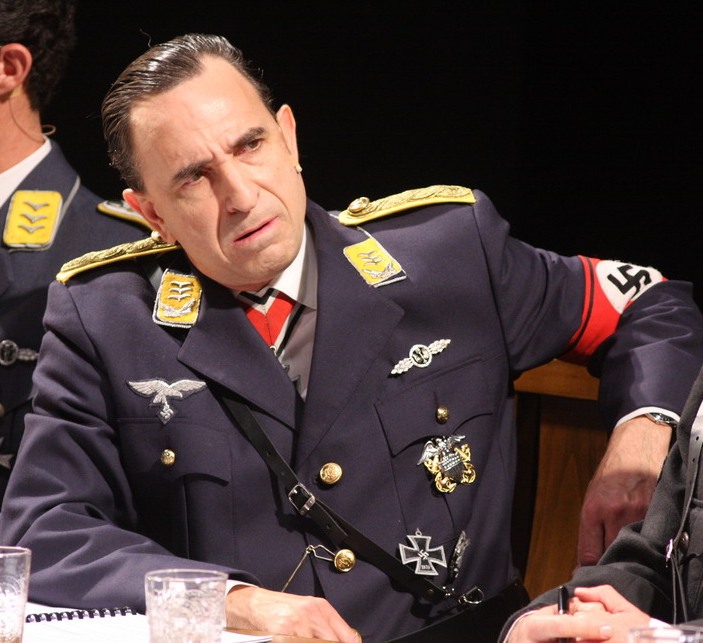
A long wooden table with a crystal carafe in the center turns slowly on the semi-dark stage, held at either end by a man in a Nazi uniform. The solemn ritual hints at the ominous events about to unfold. From Crystal to Smoke, a play by Jacques Attali, directed by Ori Egoz, takes the audience to a secret meeting of prominent Nazi leaders held on November 12, 1938, three days after Kristallnacht. A staged reading of the play was performed at the Cameri Theatre in Tel Aviv, on April 9, in the presence of President Shimon Peres, French Ambassador to Israel Christophe Bigot, Chairman of the Yad Vashem Directorate Avner Shalev and playwright Jacques Attali.

As these events recede in time, we view them from a distance. I feel the need to explain terms that might be unfamiliar to some readers, such as Kristallnacht: the night of the 9 – 10 of November 1938, when Jews throughout the German Reich and Austria were attacked, synagogues burned and stores looted. More than 60 years after these events took place, those who experienced them as children are now grandparents. Future generations will acquire their knowledge of the Holocaust through texts: archival documents, the written and filmed testimony of survivors, books – historical and fiction, films and plays such as this one.

Relying on protocols of the meeting from archives only recently open to the public, the play brings the documents to life in chilling detail. It is a rare glimpse into the private conversations of Goebbels, Göring, Himmler and other Nazi leaders who meticulously planned the elimination of the Jews, revealing an aspect of the Holocaust that has been less generally known and discussed: the economic oppression of the Jews and systematic appropriation of money and property that preceded and facilitated the ultimate “Final Solution” of the Nazis.
Introducing the play, Attali said, “I warn you what we are about to see is unbearable…a Cabinet meeting as it can take place any day in any government.” Indeed, it is a business meeting like any other, in which self-interest dominates. In the aftermath of Kristallnacht, there are two problems to address: the damages to business and property, and the Jews. Edouard Hilgard, Managing Director of “Allianz” and president of the federation of German Insurance Companies (Itshak Heskia) has been invited to participate in the discussion. As the dance of money, power and corruption begins, the underlying conflicts, intrigues and competition surface in the conversations.
There is tension between Joseph Goebbels, Minister of Propaganda (Shai Egozi) and Reinhard Heydrich, Himmler’s Deputy Head of the SD (Yehezkel Lazarov), Heinrich Himmler, SS Reichsführer, who controls the police, Gestapo, SS and SD (Gil Alon) and Wilhelm Frick, Minister of the Interior (Yossi Kantz). Personal and political motives weave a dangerous web in which anyone can be caught.
Once the dehumanization of the other is legitimized, the questions become bureaucratic and semantic rather than moral. “Anyone can be Jewish,” says Himmler (Gil Alon), casting a meaningful look at Ernst Wörman, Secretary of State for Political Affairs at the Ministry of Foreign Affairs (Avraham Moore), who had just questioned the legality of denying the Jews their insurance compensation, “it only needs to be decided.”

Attali’s choice of theatre for exploring these issues is meaningful, as theatre is a participatory medium in which the audience engages closely with the characters, their actions and inner motivations. In its presentation of the personal, emotional aspect of this process, the play enables us to better understand how such a horror can develop. Addressing the audience assembled on Friday, Attali said, “When you decide to eliminate people economically it is then bound to lead to eliminating them physically.”

This theme reverberates in the play as the conversation moves all too easily from money to murder, such as Herrman Göring, no. 2 of the regime, Generalfieldmarschall, in charge of the four year plan and preparation for war (Ohad Shachar) saying in frustration, “this Kristallnacht was an idiotic act…I would have preferred to simply kill 2 thousand Jews and not waste so much money.”
Author, historian, economist, advisor to French President Nicolas Sarkozy, and former French President François Mitterand, Jacques Attali is chairman of A & A, and the founder and president of PlaNet Finance, a non-profit organization that aims to fight poverty by developing microfinance. President Peres said of Attali, “He is one of the most original minds I have ever encountered. I would like Israel to become acquainted with one of our great and brilliant sons.”
It is to be hoped that From Crystal to Smoke will be developed into a full production as part of the Cameri repertoire.
From Crystal to Smoke by Jacques Attali
Translated by Roy Greenwald
Adapted and Directed by Ori Egoz
Set and costumes by Alexander Lisiansky
Music by Gil Smetana
Lighting by Keren Granek
Movement by Yehezkel Lazarov
Assistant to the director Rotem Kipnis
AYELET DEKEL
Photos from the staged reading of From Crystal to Smoke and the reception may be seen on Midnight East’s flickr page.





